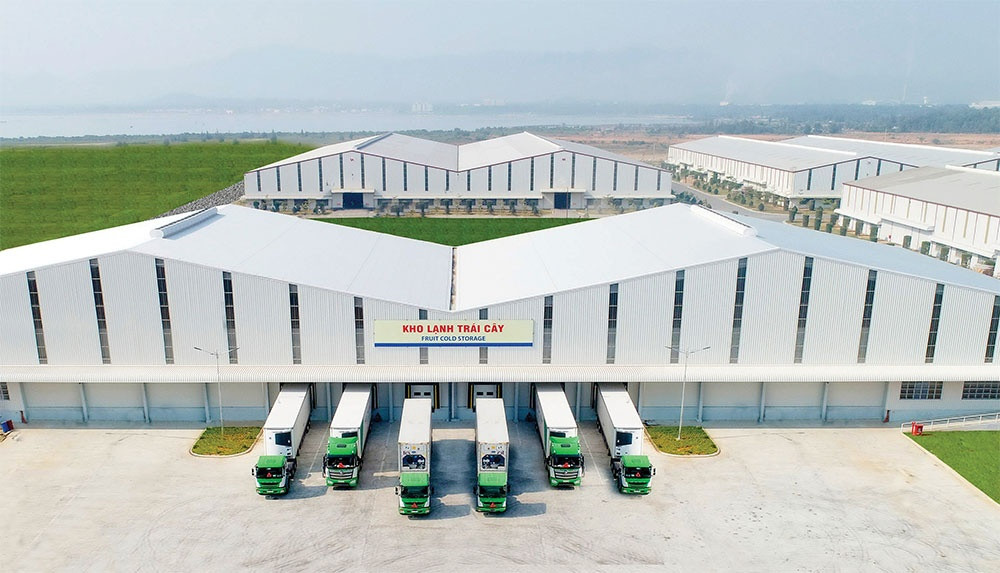According to the Industrial Insider Report published by Savills Vietnam last month, the supply of industrial real estate in Hanoi and Ho Chi Minh City was almost completely filled up, with more than 95 per cent in the capital and around 90 per cent in Ho Chi Minh City.
 |
With advantages in infrastructure and transportation, industrial land in these two areas has become more competitive, pushing rents up.Prices in Hanoi have reached nearly $140 per square metre, reaching the highest in the northern provinces. The price in Ho Chi Minh City has surpassed $200 per sq.m.
Meanwhile peak-season warehouse occupancy rates sometimes can go up to 100 per cent, according to Cushman & Wakefield Vietnam.
“We see that retailers usually start searching for warehouses around June every year, and sign short-term leases in preparation for the festive season,” said Bui Thi Huyen Trang, CEO of C&W Vietnam.
In the second quarter of 2022, figures from C&W released that the amount of warehouse supply recorded in Ho Chi Minh City reached 705,000 sq.m, with an average rental price of $5.40 per sq.m. This supply is concentrated in fringe areas like Cu Chi, Binh Chanh, Nha Be, and Thu Duc city.
The total supply in Hanoi is 180,000 sq.m, with the average rent at $5.20 per sq.m. Supply concentrates in districts like Long Bien, Dong Anh, and Gia Lam communes in the outskirts of the city centre.
“Retailers and e-commerce operators will have to be extremely flexible in the logistics chain to meet the demand according to the seasons of festivals and promotions. An ideal last-mile warehouse needs to harmonise geographical and human factors like a good location, close to a dense residential area, and an abundant labour source,” Trang told VIR.
As consumers’ purchasing patterns tend to change with the seasons, the last three months of 2022 and the beginning of 2023 will witness a wave of festive events accompanied by attractive promotional campaigns such as the Black Friday sales.
“When working with investors, we have been seeing increased demand for warehouses with approximately of 20,000sqm, located near or within proximity to the city centre. This demand becomes more volatile nearer to peak season,” she added.
However, the supply of professional warehouses meeting the above requirements is almost nonexistent in the inner areas of Vietnam’s two biggest cities.
Businesses looking for last-mile warehouses will often have to look towards townhouses to store, pack, and deliver goods. With the constrained nature of common townhouses, these makeshift warehouses need to operate continuously to avoid accumulating orders. Factors such as fire protection and workers’ health, as well as the ability to store heat-sensitive orders, are also concerning.
Therefore, it is necessary to build and apply smart order management and retrieval systems, from the time when orders are placed, packed, shipped, and delivered to the end user in the fastest and safest way.
“At these storage and fulfilment warehouses, and new technologies such as robots, drones, and sensor systems that can record inventory quantities or detect fire risks, will help create a more streamlined process. The business that can apply technology to sort and accurately quantify the time to deliver goods will be the winner,” Trang added.
Orders are likely to surge in the coming weeks in categories such as accessories, holiday decorations, fashion, confectionery and beverages, cosmetics, electronics, and consumer goods. Leading the group of e-commerce platform providers are Shopee, Lazada, Grab, Baemin, Tiki, GoJek, Sendo, ShopeeFood, Be, and AhaMove.
As consumers’ purchasing patterns tend to change with the seasons, the e-commerce supply chain therefore must be flexible.
Trang said Shopee’s biggest sales event at the end of 2021 recorded a 14-fold increase in Shopee Mall orders, and platform visits increased six times over compared to normal days. Lazada, meanwhile, also recorded 6-fold sales in hot categories such as beauty, household goods, and electronics during its super sale event on September 9.
After two years of the pandemic, Vietnam’s e-commerce market still maintains a stable growth rate of 16 per cent annually, with sales reaching $13.7 billion in 2021, according to an e-commerce report from the Vietnam Ministry of Industry and Trade (MoIT). It forecasts that the e-commerce market will reach $16.4 billion in sales by end of 2022.
This trajectory of growth is expected to continue to 2023 thanks to changed shopping habits and the increased convenience of online payment.
Compared to 2021, the percentage of consumers with no online payment options is down from 25 per cent to just 10 per cent, according to the MoIT’s report.
Source: VIR